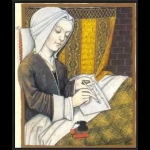Yo ave del agua floreciente duro en fiesta.
—“Deseo de persistencia,” Poesía Náhuatl
1
In the region of rain and cloud,
I live in shade,
under the moss mat of days bruised
purple with desire.
There, I run to and fro,
braiding the logical act
in the birth of an Ear of Corn,
polychromatic story I will now tell
in the weaving, power's form in motion,
a devotion to the unstressed.
Once, I wreathed around a king,
became a fishing net, a maze
“a deadly wealth of robe.”
Mothers who have heard me sing take heart;
I always prick them into power.
2
Y vengo alzando al viento la roja flor de invierno.
—Poesía Náhuatl
I
Out of the ninth circle,
a Phoenician boat rocks upward into light
and the warmth of a name—given to heaven—
that arises in the ninth realm.
Earth's realm discloses the Egyptian
on the point of invention,
heart deep in the soul's hawk,
a thymos shadow knapping the tombed body.
Some one or thing is always heaven bound.
Some flowered log doubles my bones.
The spirit of Toltec turtledoves escapes.
A sharp, metaphorical cry sends me
into the adorned sepulchre,
and the thing that decays learns
how to speak its name.
LIFT
Down Hidalgo,
past Alvarado and Basurto,
I walk a straight line
to the snailed Pasco Los Berros.
Here, at noon, the sun,
a silver bead,
veils what the dawn has displayed.
Even so,
I have taken up the morning's bond again
—the lake with its pendulum leg
shining in the distance,
the boy in white
hauling his bottle of chalky milk home.
I know I sit in the deep of a city
with its brocade of hills,
where a thin rain is an evening's fire.
I have heard the women sing
near their gas lamps,
when the rose end of day lights a hunger
for the garlanded soups and meat they prepare.
Often, I have taken the high ground
by the pond, over a frog's voice
dampened by lilies,
and been exalted by the soothsayer
who knows I'm not at home.
I am the arcane body,
raised at the ninth hour,
to be welcomed by the moonlight
of such spirited air.
I am the Dane of degrees
who realizes how the spirit glows
even as it descends.
RED
The heart, catalectic though it be, does glow,
responds to every midnight bell within you.
This is a discourse on reading heat,
the flushed char of burned moments one sees
after the sexton's lamp flows
over the body's dark book.
There is suspicion
here that violet
traces of
sacrifice
stand
bare.
FLOWER
This marble dust recalls that sunset
with the best burgundy, and the way,
after the charm of it, the peacocks
escaped their cages on the green.
I would now embellish the flame
that ornaments you,
even as it once in that moment
did.
I carry you blossomed,
cream and salt of a high crown.
You must flare,
stream forth,
blister and scale me,
even as you structure the enveloping kiss,
sporophore of our highest loss.
WINTER
Under the evergreens,
the grouse have gone under the snow.
Women who follow their fall flight
tell us that, if you listen, you can hear
their dove's voices ridge the air,
a singing that follows us to a bourne
released from its heat sleep.
We have come to an imagined line,
celestial,
that binds us to the burr of a sheltered thing
and rings us with a fire that will not dance,
in a horn that will not sound.
We have learned, like these birds,
to publish our decline,
when over knotted apples and straw-crisp leaves,
the slanted sun welcomes us once again
to the arrested music in the earth's divided embrace.
WIND
Through winter,
harmattan blacks the air.
My body fat with oil,
I become another star at noon,
when the vatic insistence
of the dog star's breath clings to me.
Though I am a woman,
I turn south,
toward the fire,
and hear the spirits in the bush.
But this is my conceit:
water will come from the west,
and I will have my trance,
be reborn,
perhaps in a Mediterranean air,
the Rhone delta's contention
with the eastern side of rain.
In all these disguises,
I follow the aroma of power.
So I am charged in my own field,
to give birth to the solar wind,
particles spiraling around the line
of my body,
moving toward the disruption,
the moment when the oil of my star at noon
is a new dawn.
3
I shall go away, I shall disappear,
I shall be stretched on a bed of yellow roses
and the old women will cry for me.
So the Toltecas wrote: their books are finished,
but your heart has become perfect.





















Comment form: